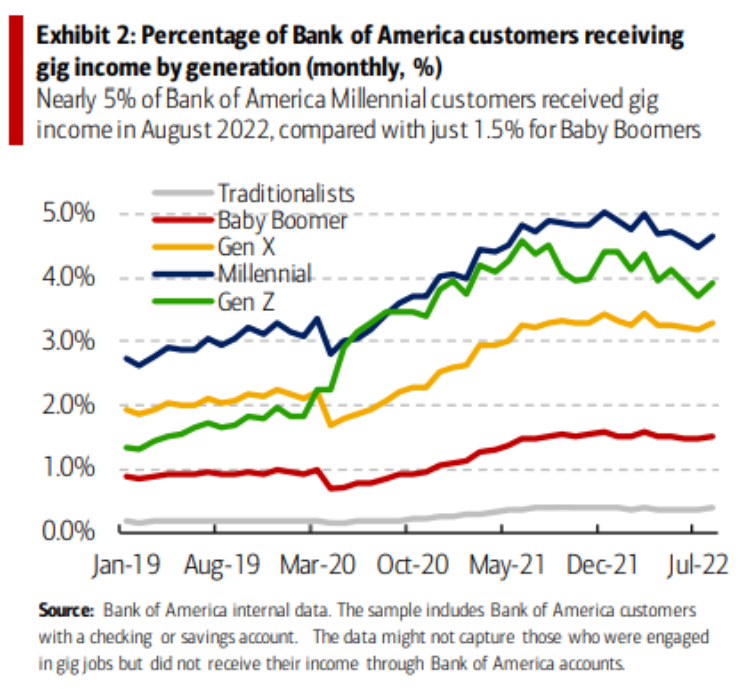September 23, 2022
Gig workers
Bloomberg is reporting on some interesting numbers on Gig workers in the USA:
- As of August, the share of BofA customers receiving income from gig platforms was 3.3%, triple the figure of 2017
- Gig workers tend to be younger, with 4.7% of Millennials garnering some such income last month and 3.9% of Gen Z’ers
- There’s no evidence that gig jobs are displacing traditional ones
Yes, "Gig" work is a result of poor full-time employment creating a tier between employed and unemployed: the not so well employed.
To fix this, it is the full-time employment (at the lowest end, but not always the lowest end) of the minimum waged worker that needs to be improved. Increase the quality of work at the low end and there will be fewer workers available to this third tier of employment.

“For most of our customers, this is supplementary income, received in just a month or two out of the past year. We believe it is likely that consumers are engaging in gig activity for additional income to counter inflationary pressures,” Anna Zhou, an economist at the Bank of America Institute, wrote in a note Thursday. BofA
PEW Research has also put out data that can be read several ways, but basically backs this up. Most "gig" workers use it to supplement low wages in their main job. A third use it as their main job (likely with multiple "gig" jobs):

Does this affect our analysis around the support for gig workers? Maybe. If we look at "gig" work as capital sees it, it might clarify some of the left's orientation to it.
Employment under capitalism and gig work
In terms of (un)employment insurance, it depends on what philosophy of capitalism and employment you are coming from. There used to be a philosophy that unemployment insurance should cover all workers who leave their jobs for any reason. This is the old UK Tory position based on a clear-eyed view of capitalism and where unemployment comes from. This is Winston Churchill's line.
That one lost out to the liberal interpretation of downloading the costs of unemployment to self-funded job bridge insurance. That is, the worker bears the risk of capitalism's terrible employment system, but spreads that risk across the whole class.
The left's analysis used to be similar to that of the old Tories in the UK: unemployment is a natural situation in capitalism. There is no way to eliminate it under capitalism, as such as we are fighting to overthrow capitalism we must fight for reforms that make capital pay as much as we can get and for as much of the support for the unemployed. In the absence of that support, workers must act in solidarity with those who do not currently have waged labour.
For gig work, if it is the (re)expansion of temporary work in an additional job to make-up for low wage in the regular job, then the solution is not necessarily found in making gig work better, but making permanent employment better and more plentiful.
How to deal with casual work and unemployment "insurance"
Under the current anti-worker liberal framework found in Canada, we need to ask the following question about "self-employed" workers and EI:
- Who lays you off from self-employment? If you lay yourself off, then how is that different from quitting?
- How do you prove it isn't a result of your incompetence (like being fired for cause), but is a result of redundancy and economic situations outside your control?
- EI is insurance. It is hard to insure against something that will definitely happen and unemployment for self-employed is definitely going to happen.
- What EI for self-employed people really means is a guaranteed annual income (subsidy) with an enforced employment regulation (that is unenforceable).
Self employment vs. Gig work
We cannot solve for self-employment. We can solve for "gig" working. Those are not the same thing. Gig workers do not have a path to belonging to larger capital. The self-employed do.
Self-employed are small business owners. They are funded by bank loans and are not worthy of comment or support from the working classes.
"Gig" workers have always existed. They fill the cracks in the labour market created by the chaotic inefficiency of the allocation of work under capitalism.
We solve for it through eliminating the cracks in regulation that these workers fall through, and make them permanent full-time (or part-time if that is possible and desired) workers.
We do not solve for gig-worker unemployment by making the working class (or a section of it depending on the insurance set-up) pay for the worst aspects of capitalist labour market externalities by funding the EI system to cover them.
The caveat to this is: unless we cannot extract anything from capital and have no power to extract even mild regulation.
Solving for the wrong problem
Come at it from another route. What problem in society does a "gig" solve? Is there any problems that it solves that are in the interests of workers?
The solution to the issue of unemployment, self-employment, and temporary employment is found in the answer to the questions of
- how those situations come about,
- who funds them, and
- who benefits from their continued existence?
Gig work is a product of not-so-mysterious economic forces in capitalism. As we seek to support the economic conditions gig workers find themselves in, we must continue to clearly state that we oppose the necessity of this kind of work and continue the struggle against it.